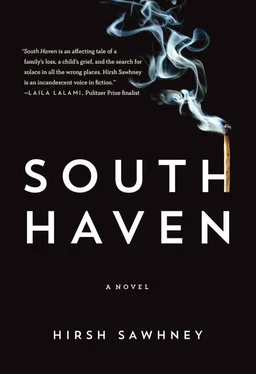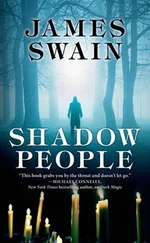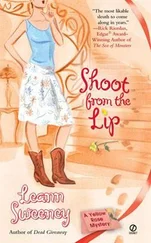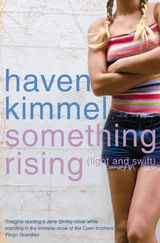Ms. Farber tilted her head. “Why is it such a. . such a violent religion?”
Siddharth had heard his father say similar things many times. When Mohan Lal had complained about the Muslims, Siddharth’s mother used to get annoyed. She reminded Mohan Lal that some of his best friends had been Muslims, that Muslims had eaten at her parents’ dinner table.
“Listen, Rachel,” said Mohan Lal, waggling his finger, “there is only one religion in the world that doesn’t perpetuate violence.”
“And which one is that?”
“Siddharth, tell her which one.”
“Buddhism,” grumbled Siddharth.
“Good boy,” said Mohan Lal.
“And the Hindus too,” said Ms. Farber. “Right? I mean, what about Gandhi? He was a Hindu. Wasn’t he?”
Siddharth didn’t understand why Ms. Farber always had to bring the conversation back to India. She loved to talk about her Israeli meditation instructor who had lived in Kerala for five years. She said she’d love to spend an entire month in an ashram, just focused on being.
“Gandhi?” said Mohan Lal. “That man was a traitor. A traitor and a charlatan.”
Twisting a curl of hair around her finger, Ms. Farber explained that she had been to Morocco once, right before she’d met Marc’s father. “The people there were so warm — kind of innocent really. But the way they treated their women — I just couldn’t stomach it.”
Mohan Lal said, “Name me a country where the women are well-treated.”
“Well, for starters, how about this one?”
“Excuse me,” said Mohan Lal, “but have we had a female president? Look at India, Britain — even Pakistan — they have all had female leaders.”
Marc snickered. “Damn, Rachel, I think you just got told.”
Siddharth laughed, but his mind was in another place now. A crisp, clear memory of his mother had formed in his mind. One evening several years earlier, the Aroras had been eating dinner, and she was telling them about one of her patients who was a Vietnam veteran. This patient was addicted to heroin, and he was missing an arm. Siddharth’s mother shook her head and said she hoped that human beings would see the truth about war. “Jesus, don’t tell me I’ve married a Gandhian,” Mohan Lal muttered. Siddharth wished his father would forget about Gandhi. Mohan Lal had come to America by choice. Nobody forced him to move here.
* * *
Marc had fallen asleep and was leaning against Siddharth’s shoulder. The weight of his body felt nice. Siddharth stayed as still as possible, mulling over the day. The tournament hadn’t been great, but he still felt calm and contented. In fact, he had a smile on his face. Here he was, in a snowstorm with Marc Kaufman, one of the toughest kids around. He wished someone from school could see Marc sitting so close to him, as if they were best friends. Brothers even. He wished Luca Peroti could see him. If Sharon could see him now, she might forget about everything that had happened. Siddharth suddenly felt a pang about Sharon. He wondered how she was doing — if her father had gotten a job closer to home, if her mother had received that promotion.
Mohan Lal turned on the radio, and a cheery voice announced a five-car pileup farther south on 91. Mohan Lal merged onto the Wilbur Cross Parkway, where the traffic wasn’t any better. Siddharth’s eyes started to flutter, and soon he was asleep too.
When he awoke, the car wasn’t moving at all. After rubbing the sleep from his face, he could make out a hazy line of cars extending all the way to the West Rock Tunnel. The windshield was fogging up, and Mohan Lal pressed a button on the dashboard. A wave of hot air washed through the car.
“I think I’ve strained my neck,” said Mohan Lal.
If Siddharth weren’t so sleepy, he would have said something. He would have told his father that he needed to do his stretches, the ones he used to do after he’d thrown out his back cleaning the gutters.
Ms. Farber said, “Tell me where. I’m pretty good with knots.”
As they exited the tunnel, she reached her hand toward Mohan Lal. Siddharth scowled, unsure if he was really seeing what he was seeing. Ms. Farber gasped all of a sudden, and her hand went to her chest. She said, “Oh my God.” The words came out as a whisper.
“Jesus,” said Mohan Lal.
Red and blue lights reflected off of Siddharth’s white karate uniform. He craned his neck and made out some road flares. Then a police officer came into view. The cop was wearing a trench coat and a cowboy hat. He was using a baton to direct traffic but looked as if he was trying to swat a fly.
After they passed the cop, Siddharth saw a maimed Buick sedan and an ambulance. Then came the deer with immense, intricate antlers. Its mouth was bloody. Its eyes were still open even though it was clearly dead. Siddharth’s mouth dried out; it felt like it was lined with sandpaper. “Jesus Christ,” he mumbled.
“Siddharth?” said Ms. Farber. She reached back and squeezed his knee. “Look away, honey. Look somewhere else.”
“Why look away?” said Mohan Lal. “The kids should see such things. These are the laws of the jungle.”
They passed the dead deer and approached another policeman, who was blocking their exit. Ms. Farber rolled down her window and the cop said, “Ramp’s closed, ma’am. Get off at 52 and follow signs for the detour.”
Exit 52 was where the Aroras got off when coming from the north. Although it was less than two miles away, it took them forty-five minutes to reach it. Once they got off the parkway, the roads in South Haven were treacherous. The van lurched and bucked as they passed the old Foster Farm. When Mohan Lal braked for a red light, the vehicle slid into the middle of the intersection.
“This is just horrible,” said Ms. Farber. “There has to be a better way home.”
Mohan Lal said something back, but Siddharth was thinking too hard to really listen.
He had seen people die on television, and he’d seen dead fish and dead mice. But he never saw his own mother’s dead body. That deer was the largest dead thing he’d ever seen, and the image of its glassy eyes was now seared into his brain. Had his mother had the same ghostly look after the accident? Whenever he’d imagined her dead, her eyes had always been closed. His mind shifted to his father. Mohan Lal would turn fifty-seven in the spring. That was officially old. Siddharth wouldn’t be able go through it again. He wouldn’t be able to live in a world without his father.
* * *
That night, he had a strange dream.
He was walking to Deer Run to practice baseball with Arjun. It was a beautiful spring day, with leaves on the trees and bright blooming forsythia. When he got to the playground, he found his brother’s rawhide glove and wooden bat resting against the school’s brick wall. He looked around for his brother, but Arjun was nowhere to be found. Siddharth was relieved for a moment, because baseball was never fun. But upon turning toward the backfield, he grew frightened.
At first it seemed the field was occupied by dogs, but upon closer look, the animals revealed themselves to be wolves. Some of them were lying on the ground and panting. Others were on the baseball diamond, grazing like livestock. A particularly large wolf stopped munching grass and stared in his direction. As Siddharth started striding toward the parking lot, the wolf trotted closer to him, so he broke into a run.
“Wait!” said the wolf.
Siddharth suddenly found himself frozen. The wolf approached him and sniffed his leg. It was totally gray except for a white line that ran from its nose to its green eyes. Some red substance, possibly blood, had stained its whiskers.
“Your brother’s gone,” said the wolf. It sounded familiar, a little like Mr. Iverson from up the street. “You must come with us. There are no other options but to come with us.”
Читать дальше












